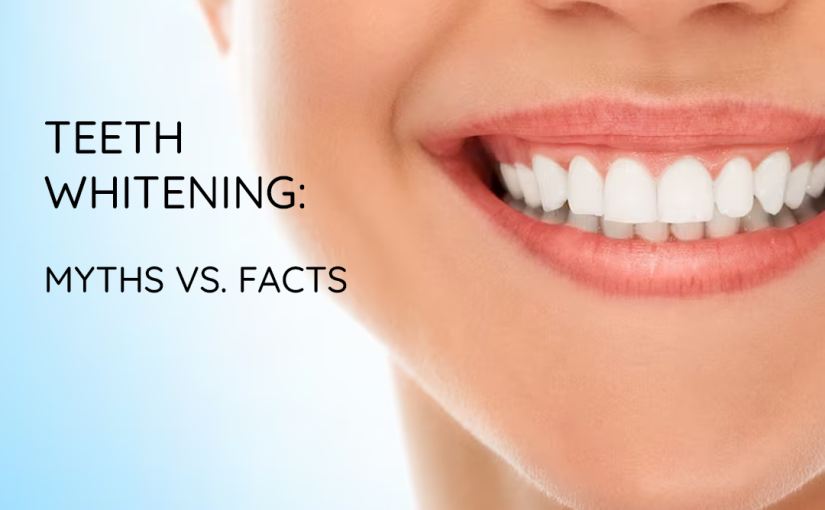Teeth Whitening: Myths vs. Facts
A bright, dazzling smile is often seen as a sign of health and vitality. It’s no wonder that teeth whitening has become one of the most popular cosmetic dental procedures in recent years. With the rise in demand for whiter teeth, a plethora of information, both accurate and misleading, has flooded the internet. It’s time to separate fact from fiction when it comes to teeth whitening.
Myth 1: Teeth Whitening Damages Your Tooth Enamel
Fact: This is a common misconception. Professional teeth whitening, when done correctly, does not harm your enamel. Teeth whitening products, whether used at home or in a dental office, are designed to be safe for your teeth. However, excessive use of over-the-counter whitening products or neglecting instructions can lead to enamel damage. That’s why it’s crucial to consult with a dentist before starting any whitening regimen.
Myth 2: Whitening Toothpaste is as Effective as Professional Whitening
Fact: Whitening toothpaste can help remove surface stains but cannot deliver the same level of whitening as professional treatments. These toothpastes contain mild abrasives and polishing agents that help with extrinsic stains (stains on the surface of your teeth). For deeper, intrinsic stains (those within the tooth), professional whitening is more effective.
Myth 3: All Teeth Whitening Products Are the Same
Fact: Not all whitening products are created equal. There are two main types of teeth whitening:
In-Office Whitening: This is performed by a dental professional and offers the fastest and most dramatic results.
At-Home Whitening: This includes over-the-counter products and take-home kits prescribed by dentists. They are effective but typically take longer to show results.
The concentration of the whitening agent (usually hydrogen peroxide or carbamide peroxide) varies between products. Professional treatments use higher concentrations for quicker results but under the supervision of a dentist to minimize risks.
Myth 4: Teeth Whitening Results Last Forever
Fact: While teeth whitening can produce long-lasting results, it’s not permanent. The longevity of your whitening depends on various factors, including your diet, oral hygiene habits, and lifestyle choices like smoking or consuming staining beverages. Touch-up treatments may be needed to maintain your desired level of whiteness.
Myth 5: Teeth Whitening is Painful and Causes Sensitivity
Fact: Some people do experience temporary tooth sensitivity or gum irritation after teeth whitening, but it’s usually mild and short-lived. Most modern whitening products contain desensitizing agents to minimize discomfort. If you have sensitive teeth, consult with your dentist, as they can recommend products and procedures to minimize any potential issues.
Myth 6: Natural Methods Like Baking Soda and Lemon Juice are Safe and Effective
Fact: Natural remedies are often touted as safe and effective, but they can be abrasive and potentially harmful to your enamel if used incorrectly. Baking soda, for example, can be abrasive and may not provide consistent results. Lemon juice is highly acidic and can erode enamel, making teeth more susceptible to staining. It’s best to consult with a dentist before trying any DIY whitening methods.
Myth 7: Whitening Works Equally Well for Everyone
Fact: Teeth whitening results can vary from person to person. The effectiveness of whitening depends on the type and severity of stains, the cause of discoloration, and the method of whitening used. Your dentist can assess your specific situation and recommend the most appropriate treatment for you.
Myth 8: Whitening Strips Are Harmless and Effective
Fact: Whitening strips can be effective for some individuals, but they can also cause uneven results and gum irritation if not applied correctly. It’s essential to follow the instructions carefully and, ideally, consult with a dentist before using them. In-office or professionally supervised at-home treatments often provide more predictable and even results.
Myth 9: Once You Whiten, You Can’t Go Back
Fact: Teeth whitening is not irreversible. If you decide you want your teeth to be less white, it’s possible to achieve a less intense shade through professional treatment or by allowing the effects of whitening to naturally fade over time.
Myth 10: Teeth Whitening Is Only for Aesthetics
Fact: While teeth whitening is primarily a cosmetic procedure, it can have psychological benefits. A brighter smile can boost self-confidence and improve overall well-being. Additionally, maintaining good oral hygiene and regular dental check-ups is essential for oral health.
In conclusion, teeth whitening, when done correctly and under professional guidance, is a safe and effective way to enhance your smile. However, it’s essential to separate myths from facts and consult with a dentist to determine the most suitable whitening option for your specific needs. A brighter, more confident smile is within reach, and with the right approach, you can achieve it safely and effectively.
At Advanced Dental Specialists, we are dedicated to providing compassionate and specialized dental care for children. Our team of experienced pediatric dentists and dental hygienists is here to guide you and your child on the path to excellent oral health. By implementing these dental care tips and partnering with our specialists, you’re ensuring a bright future of healthy and confident smiles for your little one. Let’s work together to nurture their dental health and create a positive and enjoyable dental experience for your child!

